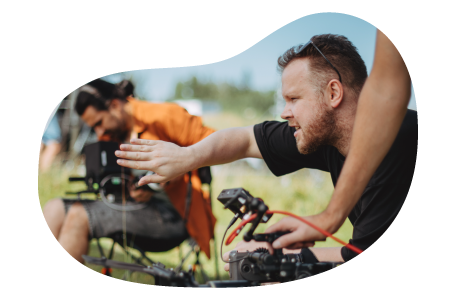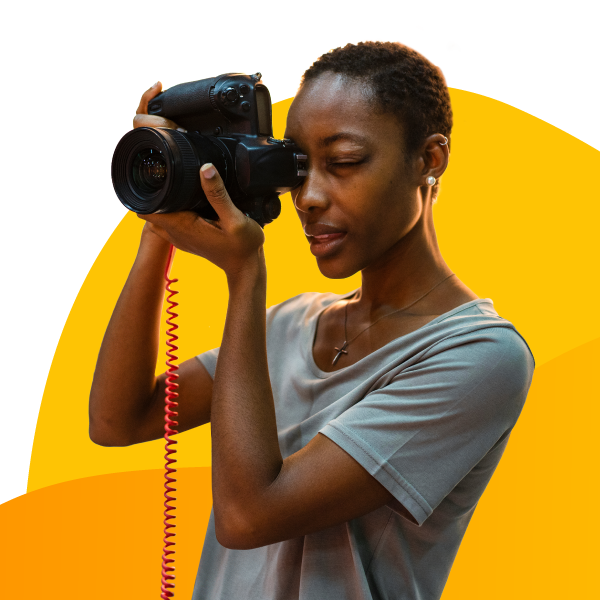

Why is insurance a must for photographers?
Blurry photos, lost thumb drives, client injuries, and data breaches are just a few of the liabilities that professional photographers face. Photography business insurance can financially protect your small business by helping you recover from lawsuits, medical expenses, property damage, and other risks.

Get the right coverage quickly
6 insurance policies every photographer should consider
These insurance products defend against the most common risks and liabilities faced by photographers.
General liability insurance
A general liability policy defends against third-party injury and property claims, such as a client who suffers an injury at a photo shoot. It's often required for a commercial lease.
- Client bodily injuries
- Accidental damage to a client's property
- Slander and other advertising injuries
Business owner's policy
A business owner's policy, or BOP, combines general liability coverage and commercial property insurance at a discount. Low-risk small businesses are often eligible for this bundle.
- Personal injury lawsuits
- Business property or equipment damage
- Business interruption coverage
Professional liability insurance
Professional liability insurance covers claims related to mistakes or poor quality of work, should a client decide to sue. It's also referred to as errors and omissions (E&O) insurance.
- Missing or blurry photos
- Professional negligence accusations
- Arriving late or missing an event
Workers' comp insurance
Workers' compensation insurance protects photography businesses and sole proprietors from work-related medical bills that health insurance won't cover. Most states require this coverage for employees.
- Medical costs from workplace accidents
- Disability benefits for injured workers
- Legal costs from employee injuries
Commercial auto insurance
Almost every state requires commercial auto insurance for vehicles owned by a business. It covers financial losses in the event of a car accident involving your photography business's vehicle.
- Auto accident legal fees
- Vandalism or other vehicle damage
- Vehicle theft
Commercial property insurance
Property coverage protects your building and its contents, such as computers and furnishings. Add inland marine insurance for cameras and other items that travel to off-site locations.
- Fires
- Storm damage
- Theft and vandalism
Photographer insurance costs

From our customer data, here's a quick look at average photography insurance costs:
General liability: $29 per month
Business owner's policy: $46 per month
Professional liability: $34 per month
Factors that can influence your photography and videography insurance costs include:
- Types of professional services offered, such as wedding photos or portraits
- Annual revenue
- Value of your business property, including camera equipment
- Business size
- Insurance products purchased
- Policy limits and deductibles
- Coverage options, such as an additional insured
Hear from business owners like you who purchased insurance coverage.
Why photographers choose TechInsurance
Get insured quickly with TechInsurance
Get insurance fast so you can get started working with clients. Fill out our easy online application, choose a policy, and pay online to start coverage today.

Common questions about business insurance for photographers
Review answers to frequently asked questions (FAQs) about photography insurance coverage and more.
Are self-employed photographers required to carry insurance?
While self-employed photographers might not be required by law to carry insurance, having coverage can help you fulfill contract terms and protect your business from financial risks and liabilities. However, some policies may be required based on the laws in the state, county, or city in which you operate.
For example, in most cases, if your photography business has employees, you'll be mandated to carry workers' compensation insurance. Workers' comp is required in nearly every state and protects your business should an assistant or worker become ill or injured on the job. This coverage is also a good idea for independent contractors and sole proprietors, who are typically exempt, as personal health insurance won't cover work-related claims.
Additionally, photographers who drive company-owned vehicles must maintain the state-specified minimum amount of commercial auto insurance. This policy offers financial protection if you or your employees are involved in an accident while driving a company vehicle, and will help cover medical expenses, property damage, and liability claims from the incident.
If you drive a personal, leased, or rented vehicle, look to hired and non-owned auto insurance for coverage.
Depending on your client, you may be asked to carry professional liability insurance (sometimes called errors and omissions coverage) before you can enter into an agreement with them. Professional liability protects your business from expensive claims over the quality of your work.
Even when not required, insurance coverage is a critical component for any LLC, sole proprietor, independent contractor, and start up photography business. It not only offers peace of mind, but can protect your business from potentially devastating financial and legal costs.
Do photographers need a license or certification?
Typically, photographers don't need a specialized business license to operate. However, depending on your state, you may have to apply for your business license through your city or county government, while other states may direct you to a state-level office.
Business licensure offers many benefits, including:
- Tax compliance
- Credibility
- Financial benefits and credit
Additionally, obtaining photography certifications is a great way to showcase your expertise to prospective clients, and helps set you apart from the competition.
Some photography certifications to consider include:
- Certified Professional Photographer (CPP): Offered through the Professional Photographers of America (PPA), this designation is almost like a master class with courses on photography fundamentals and photography equipment.
- Merited Professional Videographer (MPV): This certification is offered by the Wedding and Event Videographers Association International (WEVA) and demonstrates a high level of wedding and event video expertise.
- Drone Photography: In order to establish a drone photography business, there are a few legal steps you need to take. This includes acquiring a Remote Pilot Certification, as well as a FAA Small UAS Rule (Part 107) license.
What other types of insurance coverage do photographers need?
In addition to the policies mentioned above, businesses that offer photography services often invest in the following types of coverage:
- Tools and equipment coverage: A type of inland marine insurance, this policy safeguards your business property (such as cameras, lighting equipment, memory cards, etc.) while it's in transit, stored at an off-site location, or while at a jobsite. Specifically, contractor's tools and equipment insurance is perfect for your cameras and photography business equipment that costs under $10,000 and is less than five years old.
- Hired and non-owned auto insurance (HNOA): Photographers who drive personal, rented, or leased vehicles for business purposes should carry this coverage, as a personal auto policy won't cover accidents that happen while you're driving for work.
- Special event insurance: You may need special event insurance to cover activities outside of your typical operations, such as a wedding, town hall, or other event.
Our licensed insurance agents can help you choose policies that match your insurance needs, comply with state laws and other requirements, and save money on coverage. If you offer videography services, you may need additional coverage, such as specialized film and camera equipment insurance, which our agents can help you obtain.
Why is a COI important for a photographer?
A certificate of insurance (COI) is critical for a photography business because it provides proof of insurance to clients, landlords, and business partners. Not only does having a COI help attract and secure new clients, it may be required to shoot at certain venues and can help you stand out among competitors.
TechInsurance customers can get their certificate of insurance within 24 hours of applying for insurance, offering instant peace of mind.